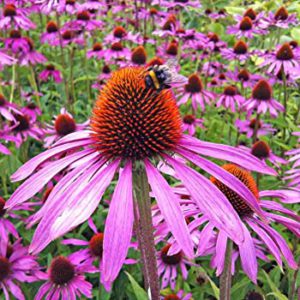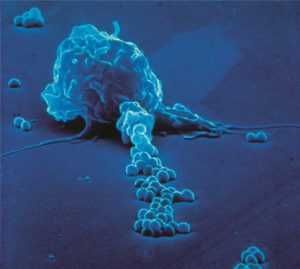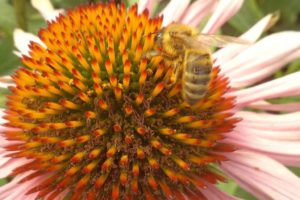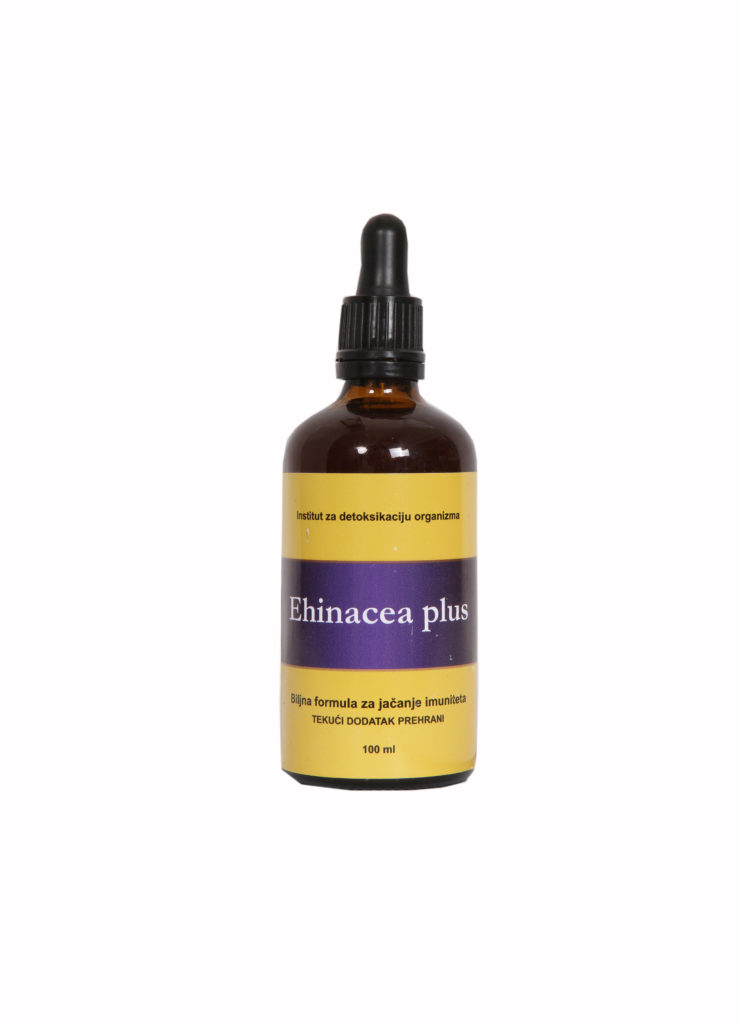Authors: Juliet Parker (2006) and Reuters editorial, 10 November 2020.
Originals:https://www.reuters.com/article/uk-health-coronavirus-britain-tcell-idUSKBN27Q001

LONDON (Reuters) - High levels of so-called "T-cells" that respond to the coronavirus may be enough to provide protection against infection, a British study said on Tuesday, adding to evidence of the crucial role these cells play in immunity against the disease. COVID-19.
T-cells (a type of lymphocyte - white blood cells, which are part of a healthy immune system) are thought to be crucial for protection against infection with the SARS-CoV-2 corona virus and can provide longer-lasting immunity than antibodies. A study of almost 3000 people, which they conducted Oxford Immunotec and Public Health England (PHE), showed that none of the participants with high T-cell responses developed symptomatic SARS-CoV-2 infection during the period the researchers followed them. This conclusion was reached by comparing 20 confirmed infections among participants in whom the T-cell response was weak. "This suggests that people with higher numbers of T-cells that recognize SARS-CoV-2 may have some level of protection against COVID-19, although more research is needed to confirm this," said David Wyllie, consultant microbiologist at Public Health England. The study has been prepared for print and has not been published in a journal or peer-reviewed. The scientists suggest that the importance of T-cells in the immune response may mean that serological tests to detect antibodies will not give a complete picture of who in the population is at lower risk of infection. They also said that the levels of T-cells that respond to SARS-CoV-2 declined with age, particularly in the absence of antibodies, which likely explains why the elderly are more at risk of contracting the disease from COVID-19.
Echinacea to strengthen the immune system

Its popularity is increasing because it is claimed to have immunostimulating properties and can reduce the severity of symptoms of the common cold and flu, especially if used in the early stages of infection. Although there are about nine species of echinacea, only three of them have attracted attention for their medicinal properties - they are: E. purpurea, E. angustifolia and E. pallida.Despite many claims of health benefits, Echinacea – like many other herbal products – lacks government regulation, because unlike pharmaceuticals, herbal products do not go through well-established and rigorous vetting procedures. The chemical composition of any plant is complex compared to drugs. Medicines contain one known active ingredient that can be tested and standardized, while only one plant can contain many active components that are difficult to standardize due to differences in plants and different extraction methods. There is very little real science behind the medical claims for a plant like Echinacea. Much of the evidence provided by herbal product manufacturers is often anecdotal or based on anecdotal studies.
Given the popularity of Echinacea, the main objectives of the study were:
- To check whether the alleged medical properties of echinacea are justified;
- To verify how echinacea works, identifying its active ingredients and their interactions with the immune system;
- To check the effect of echinacea on human health;
Check whether improper use of herbs can cause adverse health consequences.
What makes Echinacea active?

Caffeic acid derivatives – these include echinacoside, cynarin and chicory acid and are thought to contribute to the aforementioned antioxidant and anti-inflammatory properties of echinacea.
Alkamides – they are mostly found in the roots E.angustifolia and it is believed that they stimulate the work of the cells of the immune system.
Polysaccharides – we have two types: heteroxylan and arabinogalactan, both of which are reported to act on the immune system to enhance its effect.
How does echinacea work?
The active ingredients of Echinacea can strengthen or stimulate the immune response by interacting with different cells of the immune system. Immune responses can be innate (nonspecific), mediated by macrophages, natural killer cells and polymorphonuclear leukocytes (neutrophils), or adaptive (specific), mediated by B- or T-lymphocytes. Echinacea has been shown to be the most convincing in activating cells of the non-specific branch of immunity, with these cell types most prominent in reports of immunostimulation:

Natural killer cells – these are also cells of the innate immune system. Their function is to recognize and kill target cells: which are significantly virally infected, as well as tumor cells. Thus, any substance that can improve the activity of these cells is likely to improve the overall immune response. Various extracts and preparations of echinacea have been shown to increase the activity of natural killer cells.
Polymorphonuclear leukocytes include: neutrophils, eosinophils, basophils and mast cells. Neutrophils are short-lived phagocytic cells, whose granules contain powerful bactericidal and antibiotic enzymes. Eosinophils, basophils and mast cells also contain secretory granules and are involved in the anti-inflammatory response. It has been shown that echinacea has the ability to increase the activity of polymorphonuclear leukocytes, which means that they can respond much faster and destroy pathogenic substances.
How effectively does echinacea improve our health?
Echinacea does show immunostimulating properties - this has been shown for the cells of the innate immune system in humans. However, despite this evidence at the cellular level, let's admit that - when it comes to human health - in practice we have weaker knowledge. The health benefits of echinacea are largely supported by anecdotal evidence, as thousands of people throughout history have noted numerous positive health effects. However, controlled clinical trials in humans have not yielded conclusive results. Although several human clinical studies have reported health benefits, much of this evidence is conflicting and trials are limited in both size and methodological quality. So, from a scientific point of view, the effectiveness in humans has not yet been proven beyond all doubt. The quality of echinacea used in both clinical studies is certainly one of the factors that affects the validity of the results. Its immunostimulating properties depend on the presence of certain active ingredients. A recent study of the quality of herbal products showed that only 28% of echinacea products tested actually contained the amounts and types of ingredients listed on the declaration. This could explain why echinacea is effective in some trials but not in others. In short, before we draw final conclusions about its health benefits, the quality of each sample being tested should be raised to a standard level.
How safe is Echinacea?
Echinacea seems to be well tolerated. It is estimated that 1 to 4% of the general population uses it annually. There were no deaths; there were only a few with significantly adverse side effects, so the overall risk ratio looks favorable. Studies on the toxic effects of echinacea have not found a lethal dose. People previously allergic to the family Asteraceae (daisy) should be avoided, as there have been several cases of echinacea inducing anaphylaxis, asthma attacks, urticaria and contact dermatitis.
Echinacea can interact with drugs that are metabolized by a group of enzymes called cytochrome P450 and thus prolong the effect of those drugs. These include common medications and other substances, such as warfarin, alcohol, caffeine, ibuprofen, and several drugs used against HIV. Therefore, patients taking prescription drugs known to be metabolized by this enzyme system should avoid echinacea or consult a physician first.
Conclusion

Despite convincing evidence that echinacea works at the cellular level, in practice we have less knowledge about its benefits for human health. Several clinical studies on humans have confirmed its positive effects, but many of these evidences are contradictory and the trials are limited in both size and methodological quality. The inconsistency of the results can be attributed to poor quality plant raw materials. So, despite the abundance of scientific data at our disposal, the effectiveness in humans has not yet been proven beyond all doubt.
In terms of safety and reliability, echinacea is well tolerated: there have been no deaths; only a few cases with significantly harmful side effects have been recorded.
Finally, is it possible that echinacea may be a lifesaving remedy that is being ignored by official medicine and the authorities? Cancer and HIV are on the rise, but in these diseases the therapeutic value of this plant has been relatively little researched, despite the fact that its effect on the immune system may have therapeutic potential. Chemotherapy patients often die from numerous infections that occur due to weakened immunity; echinacea could help these people by boosting their immune functions at that critical time and acting as an antioxidant. More on this topic:
- Barrett, B. (2003), Medicinal properties of Echinacea: A critical review, Phytomedicine, 10: 66-86.
- Miller, SC (2004), Echinacea The genus Echinacea, CRC press, New York, USA.
- Miller, SC (2005), Echinacea: A miracle herb against aging and cancer? Records in vivo, Evidence-based complementary and alternative medicine, 3: 304-314.
- Rininger, JA, Kickner, S., Chigurupati, P., Mclean, A., Franck, Z. (2000), Immunopharmacological activity of Echinacea preparations following simulated digestion on murine macrophages and human peripheral blood mononuclear cells, Journal of leukocyte biology, 68: 503-510.
About the author: Juliet Parker is 22 years old, studied at the Department of Biosciences at the University of Nottingham, where she graduated in Zoology in 2006 as a Bachelor (B.Sc). Juliet has a particular interest in alternative medicine and would eventually like to work in the pharmaceutical industry.
A little more about Echinacea
Book source: Treatment of incurable diseases
Echinacea angustifolia root in combination with Echinacea purpurea seeds, garlic juice and hot pepper increases the number of T-station better than anything!

At the end of the 18th century, there lived a man named Joseph Mayer from Pawnee City, Nebraska. He sold various things from the caravan, among which was an alcoholic tonic made from the roots of a plant from Kansas. He got the recipe from his Indian friends. He made a tonic, put it in a bottle and sold it as a cure for all ailments. He traveled west in his caravan selling that tonic. Because of this, he became very famous both as a doctor and as an entertainer. To prove the effectiveness of his product, he let a rattlesnake bite him in front of everyone. And he never got poisoned from it. This is where the term "snake oil salesman" comes from. He claimed, and so it seemed, that it was a cure for everything from rabid dog bites to various types of infections.
"Most Echinacea products are over-the-counter only are waterscome across useless preparations. Test them and your eyesightjetc you'll think I'm right."

Echinacea is good against colds, flu and fever, as well as all types of infection, inflammation and swelling. It has a medicinal effect against any poisonous bite. It can also be applied externally.

"Immunity cannot be strengthened by consuming pizza, beer, ice cream and coffee."
Everyone would like a quick, easy way to add some Echinacea to their unhealthy diet. But it doesn't work that way. Your body will not build immune cells from beer, pepperoni pizza, ice cream and coffee. In fact, such junk food and sugar only weaken immunity. The first step in building blood cells, white and red, is a diet that will provide huge amounts of nutrients (learned C vitamin, minerals, enzymes, amino acids). That's what builds your blood, so nutrition, not some pills out there.
"Echinacea stimulates immunity, but it can't even come close." garlic on the issue of anti-infective activity."
This echinacea tincture
Echinacea is one of the strongest immune system stimulators known. It can double or triple the amount of T-cells and macrophages in your bloodstream within days. It can also increase the amount of interferon, interleukin, immunoglobulin and other important natural immune compounds present in your bloodstream. Echinacea works by creating more immune cells and immune compounds, thereby promoting their greater activity. Such stimulation of immunity is good in the case of short colds and flu, and/or for the prevention of infections. Also, this starts and accelerates the process of recovery from chronic and long-term diseases due to a drop in immunity.

For example, pharmaceutical antibiotics are indiscriminate in destroying the bacteria in your body; they simply destroy them all. This creates additional problems, because the body contains millions of so-called good bacteria, which are necessary for the development of metabolic processes. This is why many people have problems with digestion, constipation and yeast infections after taking these antibiotics. An even bigger problem is that antibiotics don't destroy the 100% of bad bacteria in your body. They usually destroy the 99%. The remaining bacteria then mutate, become more deadly and resistant to these same antibiotics. This creates very dangerous and resistant bacteria. On the other hand, garlic is completely selective in destroying bacteria, killing only those that harm your body. What is incredible is that at the same time garlic promotes the development of those good bacteria, and improves intestinal flora and digestion.

Again, that's not all. Garlic is also known for its fungicidal effect. Laboratory studies have shown that garlic is better than all existing fungicidal agents, including nystatin. Garlic regulates the growth of Candida albicans and destroys fungal tinea.
Garlic is a proven cure for cancer. About one-third of all studies on garlic are related to the treatment of cancer. Garlic not only helps white blood cells protect us from cancer, but also improves our body's ability to destroy tumors. When the constituents of garlic are present in our blood, many aspects of the immune system are improved. It also stimulates the production of interferon, the number of natural killer cells, prevents the development of tumors and even relieves the pain that accompanies cancer."




